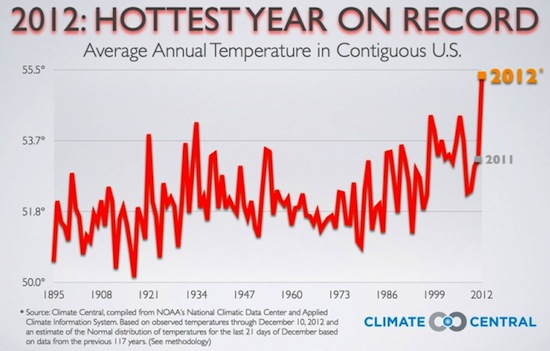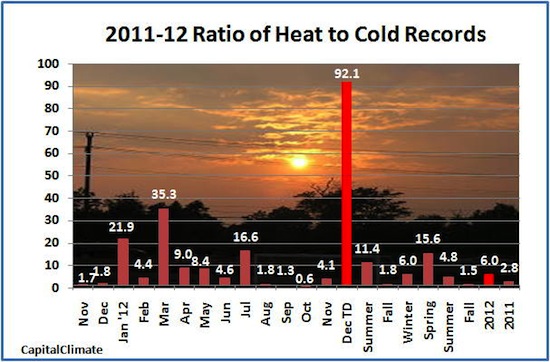Record-Smashing Early December Assures 2012 Will Be Hottest In U.S. History

We’ve had spring weather in early December — and that guarantees 2012 will be the hottest year on record for the United States.
I had reported on Monday that 2012 was virtually certain to be the hottest on record thanks to the warm November and blistering early December. Now Climate Central has done the math:
There is a 99.99999999 percent chance that 2012 will be the hottest year ever recorded in the continental 48 states, based on our analysis of 118 years of temperature records through Dec. 10, 2012.
The chart above is Climate Central’s projection of the 2012 temperature using observations through December 10 and an estimate of typical temperatures for the final 21 days of the month. If this holds true, then 2012 will blow out the previous record (1998) by more than 1°F.
How warm was early December? As Capital Climate calculates using National Climatic Data Center (NCDC) figures:
For the first 10 days of December, new daily record high temperatures have outnumbered record lows by a ratio of 92 to 1. For the 48 contiguous states, the ratio was an incredible 132 to 1, since 3 out of the 10 low records were in Alaska and Hawaii. During the entire week of December 2-8, not a single low temperature record was tied or broken in any of the 50 states, according to NCDC reports. With 3 weeks remaining in the year, the cumulative ratio of heat records to cold records for 2012 has reached 6.0 to 1, more than double the ratio in 2011.

If you want to know how to judge whether these ratios are a big deal, consider that a 2009 National Center for Atmospheric Research study found that the ratio for the entire decade of the 2000s — the hottest decade on record globally — averaged to 2.04, which is roughly double what it was a few decades before (see “Record high temperatures far outpace record lows across U.S.”). NCAR noted, “The ratio of record highs to lows is likely to increase dramatically in coming decades if emissions of greenhouse gases continue to climb.” Seriously.
This year has rewritten the record books — a winter with spring-like temperatures, a spring with summer-like temperatures, and an all-time hottest July.
You may remember that March Came In Like A Lamb and Went Out Like A Globally Warmed Lion On Steroids Who Smashed 15,000 Heat Records. As NOAA reported, in March, “There were 21 instances of the nighttime temperatures being as warm, or warmer, than the existing record daytime temperature for a given date”!
At the time, Meteorologist Dr. Jeff Masters said, “this is not the atmosphere I grew up with.” He published a detailed statistical analysis concluding, “It is highly unlikely the warmth of the current ‘Summer in March’ heat wave could have occurred unless the climate was warming.”
The science of attributing extreme events to global warming is still emerging, scientists still disagree to what extent a specific event like this heat wave is driven by global warming. But two of the leading experts explain at RealClimate why even small shifts in average temperature mean “the probability for ‘outlandish’ heat records increases greatly due to global warming.” Furthermore, “the more outlandish a record is, the more would we suspect that non-linear feedbacks are at play – which could increase their likelihood even more.”
And now we know have emerging scientific analysis that connects global warming and what is happening to the Arctic to more extreme events like heat waves:
•NOAA Bombshell: Warming-Driven Arctic Ice Loss Is Boosting Chance of Extreme U.S. Weather
•Arctic Warming Favors Extreme, Prolonged Weather Events “Such As Drought, Flooding, Cold Spells And Heat Waves”
And remember, we’ve only warmed about a degree and a half Fahrenheit in the past century. We are on track to warm five times that or more this century.
In short, Mother Nature is just getting warmed up!
You can return to the main Market News page, or press the Back button on your browser.

